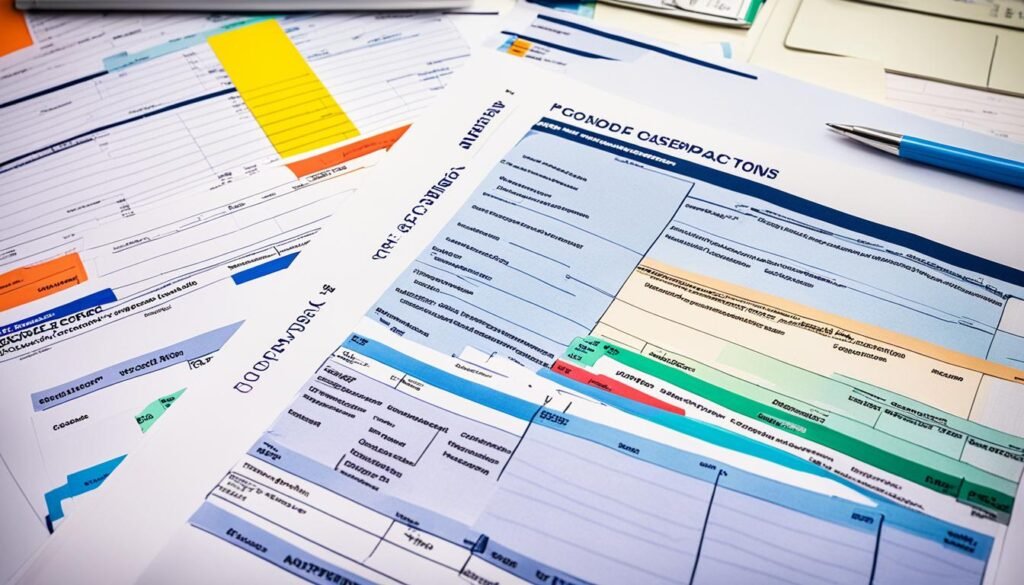Are you aware of the laws and regulations surrounding workers compensation insurance policies? Do you know what types of injuries and illnesses are covered? What if I told you that workers compensation insurance is not only crucial for protecting employees but also for safeguarding employers from potential lawsuits?
Workers compensation insurance is a vital component of any business, providing coverage for injured workers and compensation for lost income. It is essential for employers to understand the specific laws and regulations in their state to ensure compliance. Additionally, having a comprehensive workers compensation insurance policy can mitigate legal liabilities and protect businesses from potential lawsuits.
Key Takeaways:
- Workers compensation insurance provides coverage for injured workers and compensation for lost income.
- Each state has its own workers compensation system with different laws and regulations.
- Workers comp insurance protects employers from lawsuits by injured workers.
- It is highly recommended for businesses to purchase workers compensation insurance to mitigate legal liabilities.
- Workers comp insurance is not part of a Businessowners Policy (BOP) and must be purchased separately.
What Is Workers Compensation Insurance?
Workers compensation insurance provides coverage for injured workers and compensation for a portion of lost income. It also protects employers from lawsuits by injured workers.
Each state has its own workers compensation system with different laws and regulations. The coverage includes medical care, death benefits for dependents, and compensation for impairments and injuries sustained on the workplace premises or while performing job duties. Workers comp insurance also covers illnesses and occupational diseases resulting from employment.
Treatment for injured workers includes all medically necessary and appropriate care, following utilization management guidelines to control costs. Income replacement benefits are based on the type and severity of disability, generally a percentage of the worker’s weekly wage.
States may have specific requirements for obtaining workers compensation insurance.
| Benefits of Workers Compensation Insurance | Protection for Employers |
|---|---|
| Medical care for injured workers | Prevents lawsuits by injured workers |
| Compensation for lost income | Ensures compliance with state regulations |
| Death benefits for dependents | Reduces financial risk for the business |
| Compensation for impairments | Protects the employer’s reputation |
Who Needs Workers Compensation Insurance?
Workers compensation insurance is a legal requirement in nearly every state, ensuring that employers provide coverage for work-related injuries and occupational diseases. It’s important to check with your state to determine if workers comp insurance is mandatory for your business. Opting out of coverage can put your business at high financial risk, as you may face lawsuits and fines for non-compliance.
Workers compensation insurance not only protects employees but also provides employer liability protection. It safeguards your business from lawsuits filed by employees for their injuries or lost wages. By having a workers comp policy, you can avoid these lawsuits and mitigate potential legal costs. Employer’s liability insurance is typically included in workers comp policies to cover court expenses and legal fees in such cases.
How Much Does Workers Compensation Insurance Cost?
The cost of workers compensation insurance can vary depending on several factors. These include the state in which your business operates, the size of your payroll, and your claims history. To give you an idea of the average cost, in 2022, the national median cost for workers compensation insurance through Progressive was $70 per month, with an average monthly price of $117.
It’s important to note that these figures are just averages, and the actual cost for your business could be higher or lower. The nature of your business and specific risk factors will impact your premium. To get an accurate estimate, it’s best to get a workers’ compensation insurance quote tailored to your business details. This will allow you to better understand the cost based on your unique circumstances.
The premium you pay for workers compensation insurance includes several components. It covers the expenses for insurance coverage itself, as well as any payments made under deductibles. Additionally, administrative costs associated with claims handling and reporting are also included in the premium.

Understanding the cost of workers compensation insurance is crucial for budgeting and financial planning. By getting a personalized quote, you can make an informed decision about the coverage that best meets your business needs while managing costs effectively.
How to Get Workers Comp Insurance
When it comes to obtaining workers compensation insurance, you have different options depending on your state and coverage availability. Here’s a breakdown of how to secure the necessary coverage for your business:
- If you’re located in Ohio, North Dakota, Washington, or Wyoming, you’ll need to obtain workers comp insurance through the state. These states have specific regulations that only allow businesses to obtain coverage from them.
- For coverage in other states, the Progressive Advantage Business Program offers access to workers comp insurance. Progressive, in partnership with select insurers, can provide you with quotes and help you secure the coverage you need.
By partnering with Progressive, you can take advantage of their expertise in the workers comp insurance industry and benefit from a streamlined process to obtain coverage.
It’s important to note that coverage availability may vary, so it’s essential to check with Progressive or your state insurance department to ensure compliance with local regulations.
Getting workers comp insurance is a critical step in protecting your business and employees. Take advantage of the resources available through Progressive and explore your options for obtaining the right coverage.
Understanding Your Workers Comp Policy
A workers compensation insurance policy typically consists of two parts: “Part One, Workers Compensation” and “Part Two, Employers’ Liability.”
Part One, Workers Compensation:
This part of the policy covers the state-required amounts of compensation for work-related injuries. It ensures that injured workers receive the necessary medical treatment and compensation for lost income. The insurance company takes on the employer’s entire statutory obligation to pay for injury-related expenses. There is no limit on the policy amount for workers comp coverage, providing comprehensive protection for both employees and employers.
Part Two, Employers’ Liability:
Part Two of the policy provides coverage for lawsuits filed by employees regarding work-related bodily injury or illness that isn’t subject to state statutory benefits. It offers protection against claims that exceed the limits of Part One coverage. Employers’ Liability also extends coverage to other situations, such as third-party over suits and claims by spouses for loss of consortium. It safeguards employers from potential financial liabilities arising from such lawsuits.
Recordkeeping and Obligations
In most states, employers have certain obligations when it comes to workers’ compensation recordkeeping and reporting accidents. It’s important to understand these requirements to ensure compliance and facilitate the claims process for injured workers.
One of the key obligations is to keep records of work-related accidents. This includes documenting the details of the accident, such as the date, time, location, and a description of the incident. Additionally, you should maintain records of any medical treatment provided to the injured employee.
“Maintaining prompt and accurate records is crucial for initiating medical treatment and benefits as soon as possible.”

These records serve multiple purposes. They provide a valuable source of information for insurance companies, allowing them to assess the validity of the claim and determine the appropriate compensation. They also help employers track workplace hazards and identify areas where improvements can be made to prevent future accidents.
Furthermore, employers are generally required to report work-related accidents to the state workers’ compensation board and the insurance company within a specific timeframe. This ensures that the necessary steps can be taken to initiate medical treatment and benefits for the injured worker.
“Studies show that early intervention leads to faster recovery and return to work for injured workers.”
By promptly reporting accidents, you enable the insurance company to process the claim efficiently and provide the necessary support to the injured employee. This includes arranging for medical treatment, issuing compensation for lost wages, and facilitating rehabilitation and reintegration into the workforce.
“By fulfilling your reporting obligations, you ensure that claims can be processed promptly.”
To help you understand the requirements specific to your state and ensure compliance, here is an overview of the recordkeeping and reporting obligations in a few key states:
| State | Recordkeeping Obligations | Reporting Obligations |
|---|---|---|
| California | Keep records of every occupational injury or illness that results in lost time beyond the date of the incident, requires medical treatment beyond first aid, or involves a serious injury or fatality. | Report serious injuries, illnesses, or deaths to Cal/OSHA within 8 hours. File an Employer’s Report of Occupational Injury or Illness (Form 5020) within 5 days for all work-related injuries or illnesses that result in lost time or medical treatment beyond first aid. |
| Texas | Keep records of work-related injuries that result in more than one day of lost time, medical treatment beyond first aid, or certain occupational diseases. | Report work-related fatalities within 8 hours. Report work-related injuries that result in more than one day of lost time, amputation, loss of an eye, or in-patient hospitalization of one or more employees within 24 hours. |
| Florida | Keep records of all occupational injuries, regardless of severity or lost time. | Report work-related fatalities within 8 hours. Report work-related injuries that result in the in-patient hospitalization of one or more employees, loss of an eye, or an amputation within 24 hours. |
Remember, the requirements may vary by state, so it’s essential to familiarize yourself with the specific obligations in your jurisdiction. By fulfilling your workers’ compensation recordkeeping and reporting obligations, you not only ensure compliance with the law but also contribute to a smoother claims process for your employees.
State Variations in Workers Compensation
Each state has its own workers compensation system, resulting in variations in laws and regulations. These variations include the amount of benefits employees are entitled to, the types of injuries and impairments covered, the evaluation process for impairments, and the delivery of medical care.
States may have different approaches to workers comp insurance, such as providing coverage through state-run agencies, private insurance companies, or a combination of both. They also establish procedures for handling claims, resolving disputes, and implementing cost-control strategies.
It’s important for businesses to be familiar with the requirements and regulations specific to the state where they operate. This knowledge helps ensure compliance and enables businesses to effectively manage their workers compensation insurance.
Here is an overview of some key state variations:
| State | Key Variations |
|---|---|
| California |
|
| Texas |
|
| New York |
|
| Florida |
|
These are just a few examples of how workers compensation laws and regulations can vary from state to state. It’s important for employers to consult with legal and insurance professionals to fully understand the specific requirements and variations in their state.
What Injuries Are Covered?
Workers compensation insurance provides coverage for a wide range of injuries that occur on the workplace premises or while performing job duties. The specific types of injuries covered may vary depending on the state statutes and regulations. Here are some common examples of covered injuries:
- Accidents: Workers comp coverage extends to accidents that happen during work-related travel, such as traffic accidents. It also includes accidents that occur on the workplace premises, such as slips, falls, and equipment-related injuries.
- Workplace Violence: Injuries resulting from workplace violence, including assaults and acts of aggression, are typically covered by workers comp insurance.
- Terrorist Attacks: If an employee is injured in a terrorist attack while on the job, workers comp insurance can provide coverage for their medical expenses and lost wages.
- Natural Disasters: Injuries caused by natural disasters, such as earthquakes, hurricanes, or floods, that occur while performing job duties are often covered.
- Occupational Diseases: Workers comp insurance can cover illnesses and occupational diseases that result from exposure to hazardous substances, such as chemical toxins or harmful substances. These diseases may develop over time due to prolonged exposure in the workplace.
It’s important to note that injuries that occur while commuting to and from work are generally not covered by workers comp insurance. Each state has its own set of rules and regulations regarding covered injuries, so it’s advisable to consult the specific statutes and regulations in your state.
Do I Have To Buy Workers Compensation Insurance?
In most states, workers compensation insurance is mandatory for employers. Sole proprietors and partnerships may not be required to purchase workers comp insurance until they have employees who are not owners. Some states may not require coverage for employees who are paid solely on commission. The threshold for mandatory insurance coverage varies by state, with the number of employees typically ranging from three to five. Texas is the only state where workers compensation insurance is truly optional. It’s crucial to understand the requirements specific to your state to ensure compliance and protect your business from legal liabilities.
Workers Compensation Insurance Requirements by State
| State | Threshold for Mandatory Coverage |
|---|---|
| California | 1 employee |
| New York | 1 employee |
| Florida | 4 employees (construction industry) |
| Texas | Optional |
Source: Workers Compensation Insurance Board
Understanding the workers compensation insurance requirements in your state is crucial for compliance. Failing to provide the mandatory coverage can result in fines, penalties, and even legal action. By purchasing workers comp insurance, you protect your business from potential financial burdens associated with work-related injuries and illnesses.
Remember, workers compensation insurance is not only beneficial for your employees but also for your business. It provides financial protection, ensures legal compliance, and promotes a safe work environment.
Conclusion
Workers compensation insurance is an essential component of every business’s risk management strategy. It provides crucial coverage for work-related injuries and illnesses, ensuring that employees receive the necessary medical treatment and compensation for lost income. By adhering to the specific requirements and regulations set forth by your state, you can ensure compliance and avoid potentially devastating lawsuits and penalties.
Accurate recordkeeping and prompt accident reporting are vital in streamlining the claims process and facilitating timely benefits for injured workers. Furthermore, selecting a reputable insurance provider is crucial to secure the right workers compensation insurance policy for your business’s unique needs. Collaborating closely with your insurance agent or broker will help you navigate the complexities of workers compensation insurance and make informed decisions.
Protecting your business and employees through workers compensation insurance demonstrates your commitment to their well-being and safeguards against unforeseen financial burdens. By understanding the intricacies of workers comp insurance and staying up-to-date on regulations, you can prioritize the safety and security of your workforce while ensuring long-term business success.
FAQ
What is workers compensation insurance?
Workers compensation insurance provides coverage for injured workers and protects employers from lawsuits. It includes medical treatment and compensation for lost income resulting from work-related injuries or illnesses.
Who needs workers compensation insurance?
Workers compensation insurance is required by law in almost every state. It provides employer liability protection and ensures coverage for work-related injuries or occupational diseases. Sole proprietors and partnerships may be exempt in some cases, but it is highly recommended to mitigate legal liabilities.
How much does workers compensation insurance cost?
The cost of workers compensation insurance varies based on factors such as state, payroll, and claims history. The national median cost through Progressive in 2022 was per month, with an average monthly price of 7. Premiums are based on industry classification code, payroll, and location, with higher premiums for high-risk businesses and areas prone to catastrophes.
How can I get workers comp insurance?
To get workers compensation insurance, you can choose from select insurers partnered with Progressive. However, availability varies by state. In some states like Ohio, North Dakota, Washington, and Wyoming, you’ll need to secure insurance through the state. For coverage in other states, the Progressive Advantage Business Program offers access to workers comp insurance.
What does a workers comp policy cover?
A workers compensation insurance policy typically consists of two parts: “Part One, Workers Compensation” and “Part Two, Employers’ Liability.” Part One covers the state-required amounts of compensation for work-related injuries, while Part Two provides coverage for lawsuits filed by employees regarding work-related bodily injury or illness that isn’t subject to state statutory benefits.
What are the obligations for recordkeeping and reporting?
In most states, employers are required to keep records of work-related accidents and report them to the state workers’ compensation board and the insurance company within a specific timeframe. Prompt and accurate recordkeeping is crucial for initiating medical treatment and benefits as soon as possible.
How do state variations impact workers compensation?
Each state has its own workers compensation system with variations in laws and regulations. The amount of benefits, types of injuries covered, evaluation process for impairments, and delivery of medical care may vary. States may provide workers comp insurance through state-run agencies, private insurance companies, or a combination of both, and have different procedures for handling claims and resolving disputes.
What injuries are covered by workers comp insurance?
Workers compensation insurance covers injuries sustained on the workplace premises or while performing job duties. This includes accidents, workplace violence, terrorist attacks, natural disasters, and occupational diseases resulting from employment. However, injuries that occur while commuting to and from work are generally not covered.
Do I have to buy workers compensation insurance?
Workers compensation insurance is required by law in most states for employers to provide coverage for work-related injuries or occupational diseases. Sole proprietors and partnerships may be exempt until they have employees who are not owners. However, it’s crucial to understand the requirements specific to your state to ensure compliance and protect your business from legal liabilities.






















